 Petzlover
Petzlover Pastor Garafiano is originated from Spain but Tibetan Mastiff is originated from China. Pastor Garafiano may grow 19 cm / 7 inches shorter than Tibetan Mastiff. Pastor Garafiano may weigh 55 kg / 121 pounds lesser than Tibetan Mastiff. Both Pastor Garafiano and Tibetan Mastiff has same life span. Pastor Garafiano may have more litter size than Tibetan Mastiff. Both Pastor Garafiano and Tibetan Mastiff requires Moderate Maintenance.
Pastor Garafiano is originated from Spain but Tibetan Mastiff is originated from China. Pastor Garafiano may grow 19 cm / 7 inches shorter than Tibetan Mastiff. Pastor Garafiano may weigh 55 kg / 121 pounds lesser than Tibetan Mastiff. Both Pastor Garafiano and Tibetan Mastiff has same life span. Pastor Garafiano may have more litter size than Tibetan Mastiff. Both Pastor Garafiano and Tibetan Mastiff requires Moderate Maintenance.
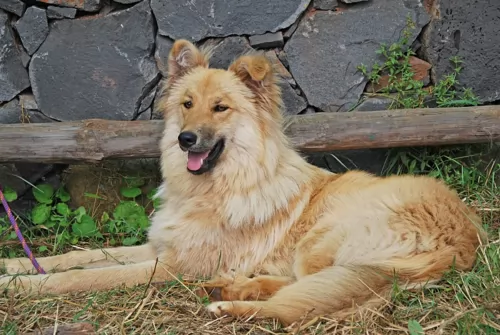 Hailing from the Canary Islands, the Pastor Garafiano is a dog which was once used for working purposes but which is essentially a pet today.
Hailing from the Canary Islands, the Pastor Garafiano is a dog which was once used for working purposes but which is essentially a pet today.
Also known as the Spanish Collie, it is not really sure if the dog really has any links to the Collie.There are dog experts who claim that there are actually very few pure specimens of this dog because of interbreeding with other breeds such as the German Shepherd.
There was a time that the breed almost disappeared but a working group was established to further establish breeding centers for the dog. Today the Pastor Garafiano is a recognized breed and he has been registered since 1982.
 The Tibetan Mastiff is still considered to be a primitive breed originating in Tibet centuries ago. The breed was developed to guard property and livestock. They still do this as well as being a much loved family dog and a show dog as well. There is very little history that is documented for the breed prior to the 19th century.
The Tibetan Mastiff is still considered to be a primitive breed originating in Tibet centuries ago. The breed was developed to guard property and livestock. They still do this as well as being a much loved family dog and a show dog as well. There is very little history that is documented for the breed prior to the 19th century.
Believed to be centuries old with ancestors who are mastiff like dogs that developed into two different types of Tibetan Mastiffs. These types are the Tsang-Khyi and the Do-Khyi. The Tsang Khyi were guardians for Tibetan monks, while the Tsang-Khyi guarded flocks for nomadic shepherds and in villages.
The first Tibetan Mastiff was imported in 1847 to England and presented as a gift to Wueen Victoria, from India’s Viceroy. By 1873 there was an English Kennel Club and the breed was labeled a large dog from Tibet and entered into the EKC Stud Book.
The next year the future King Edward VII, brought another two Tibetan Mastiffs to the United Kingdom to show in 1875. The first breed club began in 1931. The world wars interfered and no new dogs were imported to England until 1976. Two dogs were given to the President of the United States in the late 1950’sbut were not bred and it wasn’t until 1970 that any more were imported. The US Tibetan Mastiff Club was not founded until 1974 and they were first entered in a National Specialty show in 1979.
In 2007 the AKC recognized the breed as a working dog since 2007. It’s hard to find a purebred Tibetan Mastiff in Tibet anymore.
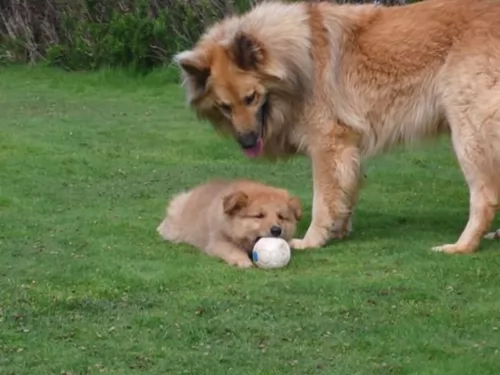 This is a medium to large dog, with its hindquarters being a bit higher than the shoulders. The body is strongly built with a deep chest. He stands at between 55 to 64cm in height and weighs between 24 to 35kg.
This is a medium to large dog, with its hindquarters being a bit higher than the shoulders. The body is strongly built with a deep chest. He stands at between 55 to 64cm in height and weighs between 24 to 35kg.
The nose is black and the eyes brown. The ears are slightly erect. The double coat is long and thick and the color is almost golden or tawny, much like a lion. Puppies are born brown and the color changes as they get older.
The tail is long, and when the dog is in motion or alert the tail is lightly curled. He is an active dog requiring a lot of intensive physical exercise. It is therefore not recommended that he be kept on a small city property but that he be on a farm or have a large garden.
This is a good looking, confident sheepdog who is also intelligent and therefore easily trained. He makes a splendidly obedient pet when he has been trained and socialized.
He is docile, calm and friendly and good with children in the home who have been taught to be kind and gentle with him. Apart from regular play, make sure he gets his regular exercise and he is constantly allowed to be part of the family.
 Both types of Mastiffs can be present in the same litter, so that both larger and smaller pups are present. Both types are well-muscled and structured. Today’s dogs being developed in China and the West are much larger than the previous ones. These dogs would be less useful to the nomads and cost too much to feed. Today’s dog is very large with a large head and a long double coat. This coat can be black, brown, gold, and blue, with or without tan markings. There are now a few white Tibetan Mastiffs being bread.
Both types of Mastiffs can be present in the same litter, so that both larger and smaller pups are present. Both types are well-muscled and structured. Today’s dogs being developed in China and the West are much larger than the previous ones. These dogs would be less useful to the nomads and cost too much to feed. Today’s dog is very large with a large head and a long double coat. This coat can be black, brown, gold, and blue, with or without tan markings. There are now a few white Tibetan Mastiffs being bread.
The breed standard for the Mastiff is different in the West than in the East. In the East the breed is broken into two categories – the Lion Head and the Tiger head.
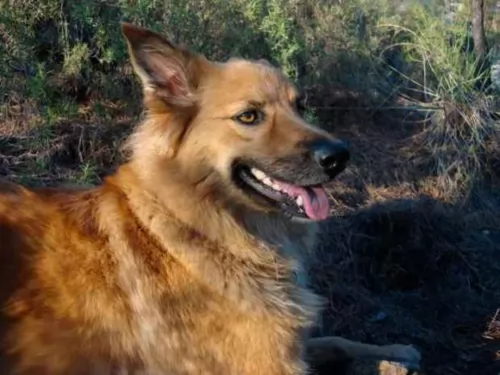 The Pastor Garafiano is such a wonderful docile and friendly pet that he is guaranteed to make a wonderful companion for any family.
The Pastor Garafiano is such a wonderful docile and friendly pet that he is guaranteed to make a wonderful companion for any family.
He is a dog that simply loves spending time with his human family and won’t do well when left alone in the backyard day after day. Take good care of this beautiful tawny dog and give him your attention and you will have a wonderful canine friend that is difficult to beat in terms of loyalty and devotion.
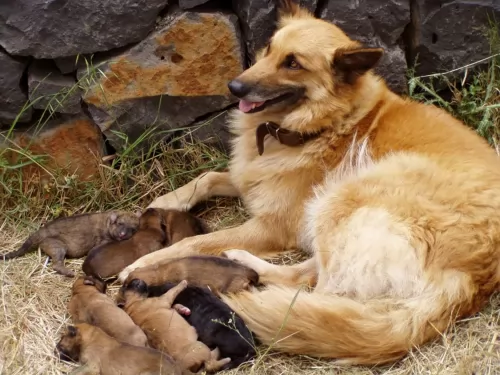 Your Pastor Garafiano can reach anything from 10 – 14 years of age if he is happy and well taken care of. Every dog however, can fall prey to one of the many common dog illnesses there are. Some of these are -
Your Pastor Garafiano can reach anything from 10 – 14 years of age if he is happy and well taken care of. Every dog however, can fall prey to one of the many common dog illnesses there are. Some of these are -
This is an inherited inflammatory disease of the skin, blood vessels and muscles. Signs of dermatomyositis can vary from mild to severe skin lesions and inflammation of muscles and even a decrease in muscle mass. Severely affected dogs can even have difficulty with swallowing. Symptoms of the disease are usually seen before the dog is 6 months of age.
This is an eye disease where there is a gradual deterioration of the retina. Dogs can become night blind early in the disease and as the disease goes on, they can even lose their daytime vision.
This is a very common dog ailment – the abnormal formation of the hip socket can cause pain, arthritis and even lameness. It is severe enough to know that dogs with hip dysplasia should never be bred.
 Though considered a primitive dog and isolated for several centuries, so they should not have as many genetic or inherited conditions as other dogs with more cross and in-breeding. These are the potential health issues they might develop:
Though considered a primitive dog and isolated for several centuries, so they should not have as many genetic or inherited conditions as other dogs with more cross and in-breeding. These are the potential health issues they might develop:
Elbow and Hip dysplasia – can lead to lameness and arthritis.
OCD Osteochondrois Dissecans – this is also an orthopedic condition when the soft tissue growth is abnormal in the joints. It is painful and the joint is stiff. Don’t breed a dog that has this condition.
Panosteitis – Canine growing pains. Inflammation of the long bones in large dogs as they grow. They will eventually out grow it. Pain can be managed through medication.
Autoimmune Hypothyroidism – Hormone deficiency leading to flaky skin, weight gain and lack of energy. Can be managed through medication.
Canine Inherited Demyelinative Neuropathy – If your Tibetan Mastiff is going to have this condition, they will have it by six weeks of age. Weakness in the hind legs leading to paralysis.
Bloat – deadly if not treated immediately and related to dietary habits.
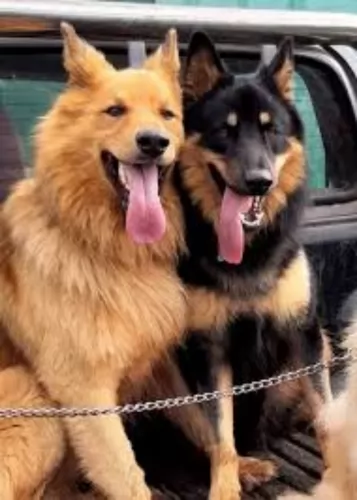 Groom your Pastor Garafiano at least twice a week. Your dog’s coat is fairly long and it sheds too and you want to make sure it doesn't become all matted. There are different brushes you can use for his beautiful coat.
Groom your Pastor Garafiano at least twice a week. Your dog’s coat is fairly long and it sheds too and you want to make sure it doesn't become all matted. There are different brushes you can use for his beautiful coat.
You can also use this grooming session to check other areas of your dog. Check inside his ears, check his eyes and feel for new or unusual lumps. Make sure to keep his nails trimmed.
Exercise your pet every day. Take him on walks or hikes and provide him with ball or frisbee games. Exercise keeps him fit and healthy but also happy and content.
Nutrition is of critical importance to your pet's wellbeing. It is important to know what your pet needs to stay healthy and have a strong immune system which can ward off disease.
There are some good commercially manufactured dog foods on the market but it is important to choose the one that doesn’t come filled with toxic colorants, preservatives and fillers. Protein should be high on the list of ingredients listed on the pet food packaging. Also make sure to feed your pet food that had been made for his size, his breed, his age and his energy requirements.
To provide some variety to your pet’s diet, give him some tasty home-made food. Dog’s do well on simplicity and consistency. Some boiled chicken, brown rice or pasta and some cooked vegetables such as spinach, sweet potato and carrots all chopped up and added into his dry kibble occasionally will keep him bright eyed and with his tail constantly wagging.
He’ll thank you for not varying his diet with things that can give him an upset stomach such as coffee, tea, popcorn, grapes, onions and chocolate.
 Don’t feed the puppy too much protein as you want to prevent Panosteitis and growing too quickly. Do not overfeed. Feed 4-5 cups of high quality large breed puppy food in 3-4 meals day.
Don’t feed the puppy too much protein as you want to prevent Panosteitis and growing too quickly. Do not overfeed. Feed 4-5 cups of high quality large breed puppy food in 3-4 meals day.
4 to 6 or more cups of a high-quality dog food daily, divided into two meals. To avoid bloat do not feed before or after vigorous exercise.
Calm and laid back when inside.
They need 20-30 minutes of vigorous exercise and play daily. They prefer to play with other large dogs.